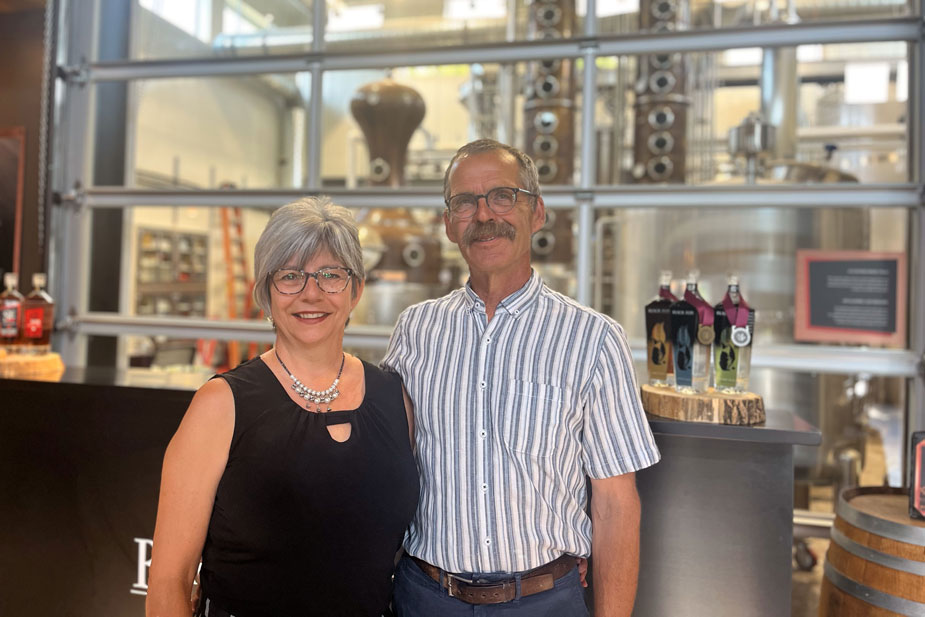
From Saskatchewan to the world
USask graduates John Cote (BSA’86) and Barb Stefanyshyn-Cote (BSA’87, MSc’94) are attracting global attention with award-winning spirits produced at Black Fox Farm and Distillery
By SHANNON BOKLASCHUKSome of the world’s finest gin and whisky is being produced in the heart of the Canadian Prairies by two University of Saskatchewan (USask) graduates who are focused on sustainability and their love of the land.
The innovators behind Black Fox Farm and Distillery, spouses John Cote (BSA’86) and Barb Stefanyshyn-Cote (BSA’87, MSc’94), are farmers combining traditional practices with modern technology to create award-winning spirits that are attracting attention around the globe.
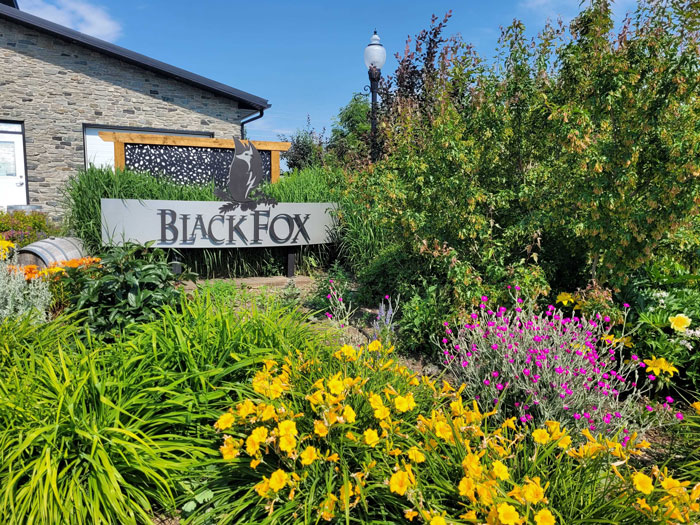
The entrepreneurs, who both grew up in rural Saskatchewan, first met in the 1980s as students at USask’s College of Agriculture and Bioresources, where Cote studied soil science and Stefanyshyn-Cote studied animal science. The USask graduates went on to run a 5,000-acre grain farm near Leask, Sask., and raise four children while Stefanyshyn-Cote pursued a career as an animal nutrition consultant after earning her Master of Science degree in 1994.
“We’re fifth-generation farmers and agriculture’s in our blood,” Stefanyshyn-Cote said.
More than a decade ago, the couple shifted gears when they sold their grain farm in 2010 and purchased 80 acres of river valley land on Valley Road, located about five kilometres southwest of Saskatoon. They dreamed of creating a craft distillery using Saskatchewan ingredients and, in August of 2015, the first batch of gin flowed at Black Fox from a custom-made German Kothe hybrid copper pot still, a piece of high-tech equipment controlled by computers.
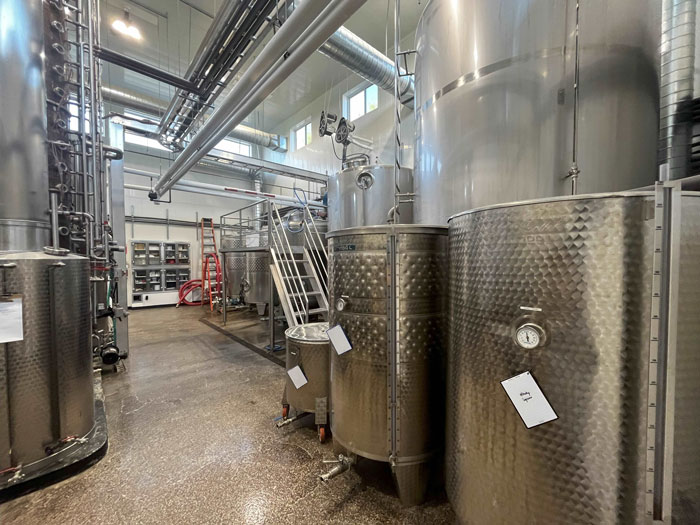
From the beginning of their farm and distillery, Cote and Stefanyshyn-Cote set their sights on excellence and uniqueness. While many brands in the Canadian whisky industry are made with corn, they aspired to offer something different.
“Canadian whisky should be made with Canadian grains, and that’s what we really, really wanted to showcase,” said Stefanyshyn-Cote.
“When we started, nobody else was doing what we were doing,” said Cote. “We’re what they call a Type 1 distillery, so everything has to start from 100 per cent raw ingredients.”
The farmers are involved in every part of the business, from growing the ingredients to marketing and distributing the final products. They aim to combine flavours with precision and intention, and each bottle sold to consumers has been fermented and distilled by Black Fox with inspiration drawn from the farm’s terroir.
“We say what we do is from crop to connoisseur,” Stefanyshyn-Cote said.
The impact of weather
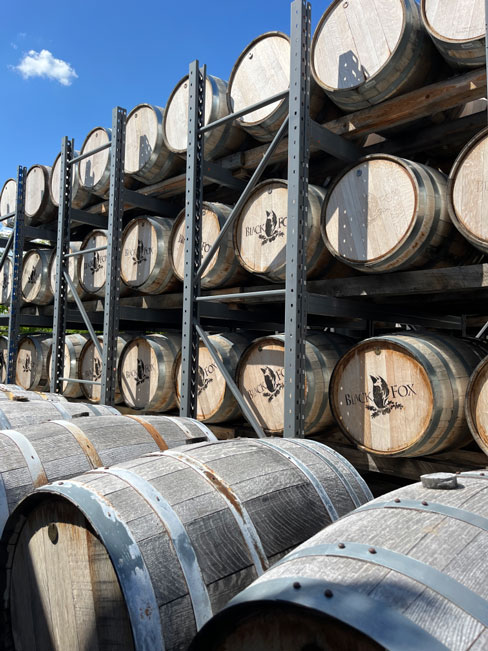
Black Fox’s products are literally infused with the taste of Saskatchewan. After production, the whisky and select gins are aged outdoors under the prairie skies. As a result, the oak barrels undergo expansion and contraction through drastically changing temperatures and throughout Saskatchewan’s distinct four seasons, producing one-of-a-kind spirits that cannot be replicated anywhere else. In fact, Black Fox is believed to be the only distillery in the world that embraces the extreme weather fluctuations that Saskatchewan has to offer and, as such, every barrel of whisky is unique; each bottle comes with a coin linked to a code so buyers can find out special information about the product they have purchased, such as where the grain was grown and what temperature shifts the barrels experienced during the aging process.
“All along, what we really wanted to do is showcase Saskatchewan terroir,” said Stefanyshyn-Cote. “You hear a lot about terroir in wine, but you don’t necessarily hear about it a lot in spirits. We have incredible growing conditions; coupled with our ag background and degrees in agriculture, we felt that we could really showcase what Saskatchewan can do in the area of growing grains and value-adding. We’re known around the world for growing some of the best grains for breads and for pasta and for cookies. Why couldn’t we make the best whisky out of that?”
Surrounded by fields of flowers, haskap shrubs, and raspberry bushes, and gardens filled with pumpkins, rhubarb, and so much more, Black Fox is an idyllic place to visit and work. More than 40 different types and 150 varieties of flowers are grown on the property, fuelling Black Fox’s popular U-pick business and the largest fresh-cut flower enterprise in the province. The couple has refined Black Fox’s business model over the years, moving from growing vegetables in the farm’s early days to its current focus on flowers and premium spirits.
“It’s a learning experience, so every day you do things a little bit smarter,” Cote said of the changes that have taken place at Black Fox during the last nine years.
Winning international awards
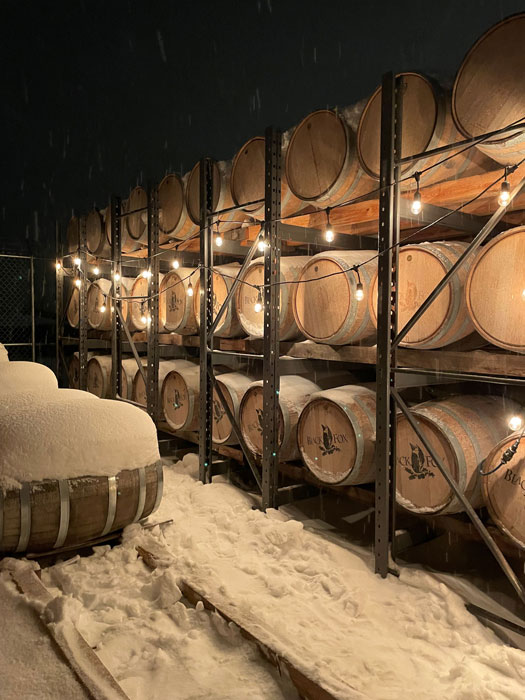
Stefanyshyn-Cote and Cote take pride in being from Saskatchewan and they continually study how the soil, the climate, and the topography of their farm influences the bounty coming from their land. They intentionally infuse a sense of place into their single-origin and small-batch spirits and are turning heads around the world as a result. In 2017, for example, Black Fox became the first Canadian distiller to win a World Gin Award when its barrel-aged vapour-infused dry gin wowed expert judges in England.
Cote said the couple enters competitions so they can see where they stack up among other distilleries around the world.
“Our focus was on creating the absolute best, so we looked for those competitions where we’ve got really just brilliant minds in taste and in food and beverage to adjudicate our things,” Cote said. “We were, I think, quite shocked and humbled when all of the sudden this little distillery in Canada, that nobody had ever heard about, was coming home with some of the most prestigious awards in the world. One of our gins was named the best gin in the world, if you can even believe that; it’s like, how did that even happen? But it happened because we wanted to.”
Black Fox’s SE Eleven Blended Whisky—a limited release with only 500 bottles produced annually—has also captured international awards, including Gold at the World Whisky Masters competition in London, England, and Gold at the International Wine and Spirits Competition; it was also named one of the Top 20 Worldwide Whiskies. The distillery’s SE Eleven Single Grain Whisky—Black Fox’s flagship product that is crafted to celebrate the strength of a single grain—is an international and national favourite, winning a Masters medal (higher than Gold) at the International Wine and Spirits Competition and a Gold Medal Award, Best in Class category, at the Canadian Artisan Spirit Competition in Vancouver in 2020.
The couple continues to be humbled and honoured by the recognition.
“We didn’t realize that we were doing something really unique until about two years ago—and everybody else around the world was kind of looking at our business model and saying, ‘That’s cool. They’re doing something unique,’ ” said Cote. “Barb had gone down to a big conference in the United States and started touching base with all the other distillers. They couldn’t believe that we knew the plant genetics, that we knew the soil profiles. Everybody else had little bits of the puzzle, but we had seemed to be able to put it all together.”
Black Fox now exports its products all over the world, including to Asia and Europe.
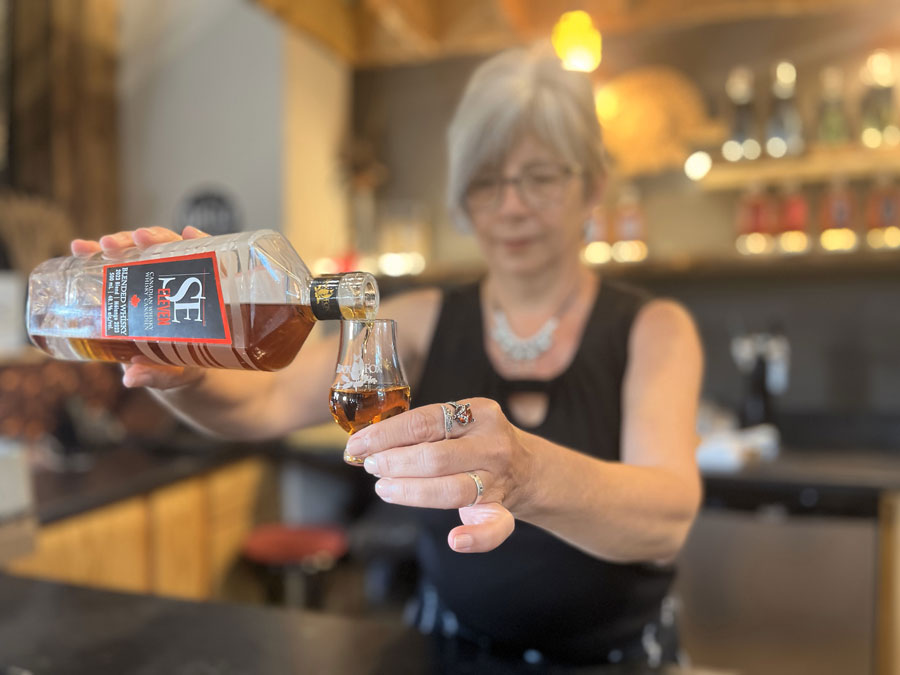
“We have a global market,” said Stefanyshyn-Cote. “Our products are found in China, in the U.K., Germany, Denmark. We recently got our first order from Dubai and, in May, the Four Seasons Hotel from Abu Dhabi placed our products on their bars, so that’s pretty special.”
In the spirit of innovation and continuous improvement, Stefanyshyn-Cote and Cote are always trying new things, such as experimenting with calendula flowers, rhubarb, chokecherries, cucumbers, and mustard seeds in their gin. The company has partnered with the Saskatchewan Research Council to study the weather on the farm and how it impacts the company’s whisky. Research has shown that while high temperatures can mature whisky more quickly, changes in temperature—such as the variance characteristic of Saskatchewan’s climate—can impact whisky more.
The entrepreneurs are happy to share what they have learned over the years, offering tours and tastings at Black Fox as well as experiences such as cocktail-making classes. They attribute their curiosity and willingness to experiment to the high-quality education and the encouragement they received as students at USask.
“Someone is going to create the world’s best casked gin. They’re going to create one of the top 20 whiskies of the world. Why can’t it be us? We really feel strongly that our background and our education and the start that we got—especially from the university—is what really led us to that,” said Stefanyshyn-Cote.
Commitment to sustainability
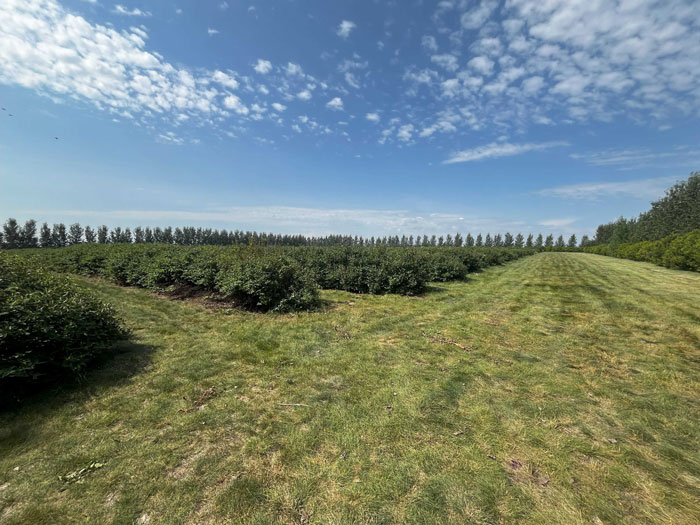
In all aspects of their business, Stefanyshyn-Cote and Cote are committed to sustainability and are inspired by their love of the land. Their distillery’s name, Black Fox, was also drawn from nature, inspired by a rare black fox that had moved onto their grain farm near Leask and played in a field with a red fox there.
From their ingredient production to their efforts around distillation, transportation, packaging, and water conservation, Stefanyshyn-Cote and Cote incorporate agronomic practices that are built on environmental stewardship. Water conservation and waste reduction are big parts of this; for example, they reuse nearly 95 per cent of their water, while spent grains and fruits are returned to the farm’s flowers and orchards as compost fertilizer. As “the caregivers” of the land, the entrepreneurs believe it is their responsibility to give the land back to the next generation in better condition than when they received it, Stefanyshyn-Cote said.
“You want to always continuously improve something. It’s always been part of the way we farm, but now we incorporate that into just everything we do,” Cote added. “The biggest part about sustainability is that you have to have the realization that you may not be perfect today—and we realize that—so every day you try and keep doing something better.”
Some of Black Fox’s sustainability initiatives include minimum-tillage practices, crop rotation, state-of-the-art drip irrigation systems, bio-filtration for runoff water, composting, and waste stream, nutrient, and habitat management. The company also uses organic cleaning solutions to lessen its impact on the environment.
The Black Fox owners draw inspiration from USask and its people, including researchers and fellow alumni, as they explore best practices in agriculture, farming technologies, operating procedures, and environmental stewardship.
“You’ve got so many people that have so many brilliant ideas that have gone around the world, and they’re looking at best-in-class solutions,” Cote said.
USask connnections
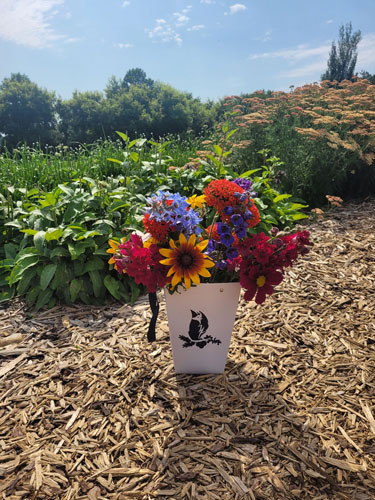
Cote and Stefanyshyn-Cote are excited about what they do each day and are continually connecting with other producers, entrepreneurs, and agronomists at home and abroad. They have studied and consulted on five continents and were proud to be named Saskatchewan’s and Canada’s Outstanding Young Farmers in 2001. In 2003, Stefanyshyn-Cote was a recipient of the prestigious Nuffield Canada Agricultural Scholarship, through which she studied rural depopulation. In 2019, Cote was also named a Nuffield Scholar. Continuous learning, and sharing what they learn, is a priority for the couple.
“People are really genuinely interested in what happens outside of the city, and we love to be able to show them,” said Cote.
As their business continues to change and grow, Cote and Stefanyshyn-Cote look back with fondness at their time as USask students and at the connections they made with fellow alumni—and each other. Attending USask was a pivotal point in their lives that helped set them on their current path.
“Those friends have lasted, obviously, a lifetime for us,” Cote said.
Cote describes USask as “second to none in the world,” and he and Stefanyshyn-Cote remain connected to their alma mater, to the College of Agriculture and Bioresources, and to events happening on and around campus. In July 2024, for example, Stefanyshyn-Cote presented at the 24th International Farm Management Association’s Congress, which was held on the main USask campus in Saskatoon. In addition, Stefanyshyn-Cote has served a sessional lecturer at USask, teaching classes such as AGRC 298: International Agriculture, which she introduced to the college, and AGRC 111: Introduction to Plant and Soil Sciences. She tells her students that the friends and connections they make at the university will remain important throughout their lives.
“I do a bit of lecturing on campus now and, every once in a while, I will remind (them to) that take a look around you, because these are your peers that are going to be going through their career at the same time you are—and you never know where anybody’s going to end up,” she said.
“Our education didn’t end at the University of Saskatchewan; every day it’s about learning,” Cote said. “And I think that’s the most important thing that we learned in those formative years, is that education never ends. You have to keep an open mind.”

